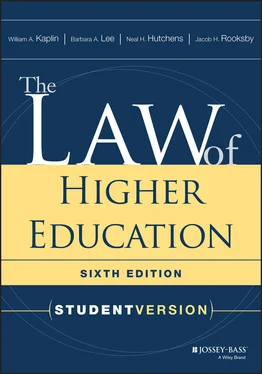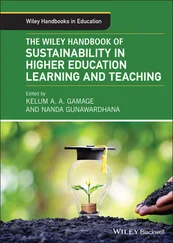When plaintiffs assert constitutional claims against an institution of higher education, deference issues may work out differently than when statutory claims are asserted. In a statutory case—for example, a case asserting that an institution has violated a federal civil rights law—the court will first be concerned with interpreting and applying the law consistent with Congress's intentions and in this regard will generally defer to Congress's own judgments about the law's application (see, for example, Eldred v. Ashcroft , 537 U.S. 186 (2003)). Thus the court will take its cue on deference from Congress rather than developing its own independent judgment on the matter. In Cannon v. University of Chicago , 441 U.S. 677 (1979), for example, the plaintiff sought to subject admissions decisions to the nondiscrimination requirements of Title IX of the Education Amendments of 1972. The defendant argued that it would be “unwise to subject admissions decisions of universities to judicial scrutiny at the behest of disappointed applicants” because “this kind of litigation is burdensome and inevitably will have an adverse effect on the independence of members of university committees.” Responding, the Court asserted that “[t]his argument is not new to this litigation. It was forcefully advanced in both 1964 and 1972 by congressional opponents of Title VI and Title IX, and squarely rejected by the congressional majorities that passed the two statutes.” The Court followed suit, rejecting the defendant's claim to deference. In other cases, involving other statutes, however, courts may discern that Congress intended to be deferential to postsecondary institutions in some circumstances and that courts should do the same.
In contrast, when plaintiffs assert constitutional claims and institutions ask the court for deference, the court is on its own; its response is shaped by consideration of applicable prior precedents and the applicable standard of judicial review. Grutter v. Bollinger , 539 U.S. 306 (2003), a constitutional challenge to the University of Michigan Law School's race-conscious admission policy, is a leading example of this type of case. The plaintiffs, rejected applicants, sought a rigorous, nondeferential application of the federal Constitution's equal protection clause; the university sought deference for the academic judgments it had made in designing and implementing its diversity plan for admissions. The Court applied strict scrutiny review, requiring the university to show that maintaining the diversity of its student body was a compelling state interest. In applying this standard, however, the Court emphasized:
The Law School's educational judgment that such diversity is essential to its educational mission is one to which we defer… Our scrutiny of the interest asserted by the Law School is no less strict for taking into account complex educational judgments in an area that lies primarily within the expertise of the university. Our holding today is in keeping with our tradition of giving a degree of deference to a university's academic decisions, within constitutionally prescribed limits [539 U.S. at 328].
This deference was a critical aspect of the Court's reasoning that led it, in a landmark decision, to uphold the law school's admissions policy. A more recent example of judicial deference occurs in Christian Legal Society v. Martinez , 561 U.S. 661(2010), discussed in Section 10.1.4 of this book. Both the majority opinion and Justice Stevens's concurrence note that judges should leave policy making to the educators.
In other constitutional cases, courts may reach the opposite result. In the Virginia Military Institute (VMI) case, United States v. Virginia , 518 U.S. 515 (1996) (discussed in Section 7.2.4.2), for instance, the U.S. Supreme Court bypassed the defendant institution's expert evidence and declined to defer to its judgment that maintaining VMI as an all-male institution was essential to the institution's educational mission. The Court's apparent reason for refusing to defer, and the apparent distinction between Grutter and United States v. Virginia , is that the Court did not view the state's judgments over the years about VMI's all-male character to be genuinely academic judgments but rather viewed them as judgments based on other factors and later dressed up with educational research for purposes of the litigation. The state's proffered educational reasons for the all-male policy were “rationalizations for actions in fact differently grounded,” said the Court, and were based on “overbroad generalizations” about the abilities and interests of the sexes.
The paradigmatic setting for institutions' invoking academic deference, and courts' granting it, is the setting of faculty tenure, promotion, and termination decisions. The deference issues arising in this setting and the key cases are discussed in Section 5.4.2, as is the evolving tendency of courts to subject these decisions to thorough scrutiny for fairness while deferring to the academic standards used to evaluate a candidate for promotion or tenure.
When faculty members challenge adverse personnel decisions, they may assert statutory claims (such as a Title VII sex discrimination claim), or constitutional claims (such as a First Amendment free speech or academic freedom claim), or sometimes common law claims (such as a breach of contract claim). In response, institutions typically argue that courts should not involve themselves in institutional personnel judgments concerning faculty members, since these are expert and evaluative (often subjective) academic judgments to which courts should defer. 2 Institutions have had considerable success with such arguments in this setting. They have also achieved similar success in cases concerning their academic evaluations of students; indeed, a student case, Regents of the University of Michigan v. Ewing , 474 U.S. 214 (1985) (discussed below), is one of the primary authorities on academic deference.
In a constitutional case, Feldman v. Ho , 171 F.3d 494 (7th Cir. 1999), for example, a professor claimed that Southern Illinois University did not renew his contract because he had accused a colleague of academic misconduct. The court rejected his First Amendment free speech claim by emphasizing the university's own academic freedom to make its own personnel decisions:
A university seeks to accumulate and disseminate knowledge; for a university to function well, it must be able to decide which members of its faculty are productive scholars and which are not (or, worse, are distracting those who are)…
If the University erred in telling [Professor] Feldman to seek employment elsewhere that is unfortunate, but the only way to preserve academic freedom is to keep claims of academic error out of the legal maw [171 F.3d at 495–97].
At the same time, the court in Feldman issued a strong statement on the need for courts to defer to the academic judgments of colleges and universities:
[A]n unsubstantiated charge of academic misconduct not only squanders the time of other faculty members (who must analyze the charge, or defend against it) but also reflects poorly on the judgment of the accuser. A university is entitled to decide for itself whether the charge is sound; transferring that decision to the jury in the name of the first amendment would undermine the university's mission—not only by committing an academic decision to amateurs (is a jury really the best institution to determine who should receive credit for a paper in mathematics?) but also by creating the possibility of substantial damages when jurors disagree with the faculty's resolution, a possibility that could discourage universities from acting to improve their faculty… If the kind of decision Southern Illinois University made about Feldman is mete for litigation, then we might as well commit all tenure decisions to juries, for all are equally based on speech [171 F.3d at 497].
Читать дальше












